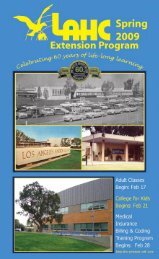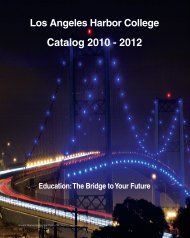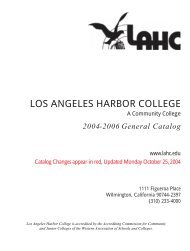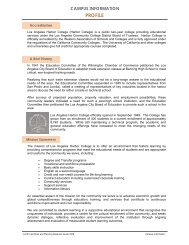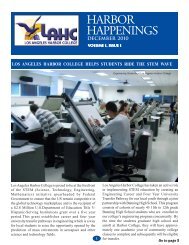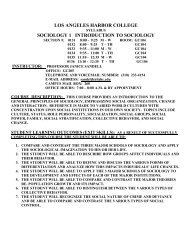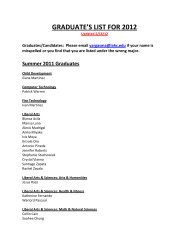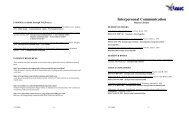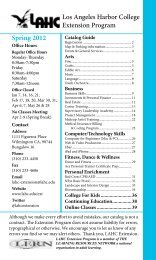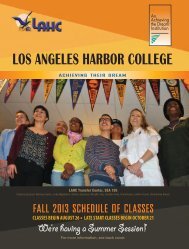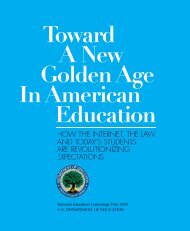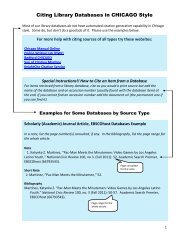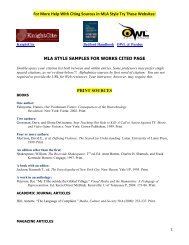Download File - Los Angeles Harbor College
Download File - Los Angeles Harbor College
Download File - Los Angeles Harbor College
You also want an ePaper? Increase the reach of your titles
YUMPU automatically turns print PDFs into web optimized ePapers that Google loves.
50 - BASIC ELECTRONICS (4 UNITS) CSU<br />
This course introduces basic direct current circuit analysis<br />
fundamentals to students entering the field of Computer<br />
Technology. Lecture presents DC concepts through series<br />
parallel circuits. Selected topics include, laboratory test<br />
equipment care and application, laboratory procedures and<br />
report preparation, component identification, interpretation<br />
of equipment specifications, technical problem-solving<br />
techniques. Lecture is complemented with a 3-hour<br />
laboratory session whereby experiments are utilized to<br />
reinforce lecture topics and concepts.<br />
52 - FUNDAMENTAL COMPUTER CIRCUITS<br />
AND LABORATORY (4 UNITS) CSU<br />
Prerequisite: Completion of Engineering Technology 050 with a grade<br />
of “C” or better.<br />
This course presents the theory and application of<br />
direct current (DC) circuit analysis for series, parallel<br />
and complex circuits, as applied to computer circuits.<br />
Ohms Law, Kirchoff’s and network theorem analysis<br />
are emphasized in conjunction with resistive, capacitive,<br />
inductive and magnetic properties associated with<br />
combinational DC Circuit Analysis. A 3-hour per week<br />
laboratory accompanies the 3-hour lecture per week,<br />
in order to reinforce lecture and textbook theory and<br />
applications. Students prepare technical reports on their<br />
laboratory experiences. This course familiarizes students<br />
with basic test measuring equipment used in the computer<br />
industry.<br />
53 - FUNDAMENTAL COMPUTER CIRCUITS<br />
LABORATORY 1 (1 UNIT) CSU<br />
Prerequisite: Completion of Engineering Technology 052 with a grade<br />
of “C” or better.<br />
This course analyzes the basic laws of electronics through<br />
self-paced study laboratory procedures. The student<br />
performs laboratory investigations of network theorems<br />
using such test equipment as volt-ohm-amperes meters,<br />
DVM and D.C power supplies and submits written lab<br />
reports. Analytical investigations of R/C and R/L time<br />
constant circuits are also included.<br />
54 - FUNDAMENTAL COMPUTER CIRCUITS<br />
LABORATORY II (4 UNITS) CSU<br />
Prerequisite: Completion of Engineering Technology 052 with a grade<br />
of “C” or better.<br />
This course gives a detailed study of alternating current<br />
theory and applications (through lecture, discussion, and<br />
laboratory). The following topics are stressed: reactance,<br />
impedance, filtering and amplification gains and losses,<br />
admittance, resonance, and transformers. The emphasis is<br />
on solution of alternating current circuit problems using<br />
basic circuit theorems. In addition, student generated<br />
technical reports are emphasized. This course prepares the<br />
student for the study of solid state circuitry.<br />
55 - FUNDAMENTAL COMPUTER CIRCUITS<br />
LABORATORY II (1 UNIT) CSU<br />
Prerequisite: Completion of Computer Technology 054 and Electronics<br />
006 with grades of “C” or better.<br />
This laboratory course provides additional self-paced<br />
experimental study of alternating current theory in<br />
Computer Tecnology-54. Experiments are performed<br />
with such test equipment as signal generators, time-base<br />
oscilloscopes, and the impedance bridge, EVM, and AC<br />
RMS meters.<br />
56 - COMPUTER LOGIC AND ARITHMETIC<br />
(4 UNITS) CSU<br />
Prerequisite: Completion of Computer Technology 050 or Computer<br />
Technology 052 with a grade of “C” or better.<br />
This course covers the basic theory and application of logic<br />
circuitry as applied in digital computers. Boolean algebra,<br />
number systems, coding and decoding, truth tables, logic<br />
maps, basic logic gates, combinational logic circuits, flip/<br />
flops, arithmetic circuits, counters, registers, and concepts<br />
of storage devices are thoroughly discussed. The use<br />
of a digital trainer is used to reinforce these concepts<br />
and applications. In addition, technical report writing is<br />
emphasized.<br />
58 - INTRODUCTION TO COMPUTER SYSTEMS<br />
(3 UNITS) CSU<br />
Prerequisite: Completion of Computer Technology 056 with a grade<br />
of “C” or better.<br />
Corequisite: Concurrent enrollment in Computer Technology 073.<br />
This course covers the operation and organization of digital<br />
computers and microprocessors, including addressing,<br />
access, 1/0 (D-A and A-D) internal synchronization.<br />
Other storage devices (solid state) and logic control<br />
circuits are covered. The concepts of logic-design are<br />
used in the evaluation of these circuits. Operational<br />
computers and microprocessors are used to evaluate these<br />
circuits in a system. An introduction to machine language<br />
programming is also included.<br />
60 - COMPUTER MATHEMATICS I (5 UNITS)<br />
This course in computer mathematics includes the<br />
operation of the calculator, signed numbers, powers of ten<br />
notation, operations with algebraic expressions, fractional<br />
expressions, functions, quadratic solutions, engineering<br />
& scientific notation, graphing, and application of<br />
mathematics to technical applications.<br />
126 * Course Descriptions <strong>Los</strong> <strong>Angeles</strong> <strong>Harbor</strong> <strong>College</strong>



